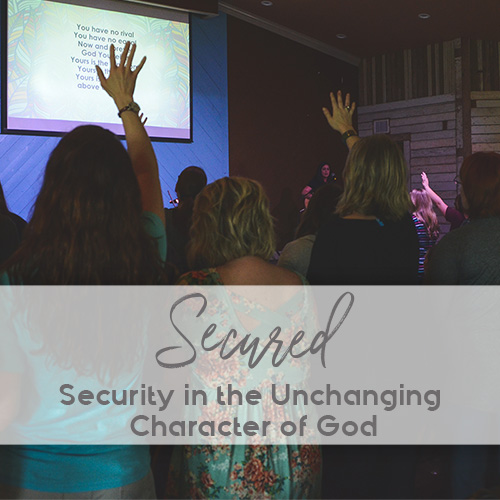Secured: Security in the Character of God
 In March 2017, Hope Moms from all across the country gathered in Giddings, TX for the annual Hope Mommies Retreat. Together, they spent the weekend sharing the stories of their precious babies, and finding that Christ can indeed comfort the brokenhearted, often through the hands and tears of another sufferer along the way. The theme of the 2018 retreat was “Secured.” In this mini series, our retreat speaker, Lindsey Dennis, takes us through Psalm 91:1-4 in order to give us a greater picture of the security we have been given in Christ.
In March 2017, Hope Moms from all across the country gathered in Giddings, TX for the annual Hope Mommies Retreat. Together, they spent the weekend sharing the stories of their precious babies, and finding that Christ can indeed comfort the brokenhearted, often through the hands and tears of another sufferer along the way. The theme of the 2018 retreat was “Secured.” In this mini series, our retreat speaker, Lindsey Dennis, takes us through Psalm 91:1-4 in order to give us a greater picture of the security we have been given in Christ.
“I will say to the Lord,
‘My refuge and my fortress, my God in whom I trust.”’
Psalm 91:2
 There is a song, often sung with greater conviction in seasons of suffering, that contains the line, “When all around my soul gives way, He is then my hope and stay.” I know, because in my own season of loss, that song took on far greater meaning. In fact, most songs did. At least the lyrics themselves caused me to think and wrestle in ways I hadn’t before.
There is a song, often sung with greater conviction in seasons of suffering, that contains the line, “When all around my soul gives way, He is then my hope and stay.” I know, because in my own season of loss, that song took on far greater meaning. In fact, most songs did. At least the lyrics themselves caused me to think and wrestle in ways I hadn’t before.
There is a difference between slapping on truth, and truly wrestling with it. When we wrestle, we begin to discover if our security is in fact in God alone, or in our circumstances. As the Psalmist says “He is my refuge and my fortress.”
He is. Not He might be, or He could be, or I wonder if He really is, but He is. It is a remarkable statement of trust as you consider the verses that follow in this passage—the statement of the pain and struggle the psalmist is acknowledging both himself and his people endure.
There are aspects of God’s character—the depth of His goodness, love, hope, and sovereignty in the midst of changing and seemingly hopeless circumstances—that are more firmly rooted and understood in the heart of the sufferer. Although I’m sure none of us are inclined to desire suffering, if we are walking with Christ, it will come. And while we ought not be terrified by this reality, it is something to be prepared for.
Too many times in our Western culture of comfort and ease, where we think we can set up enough cautionary boundaries in our life to give us the illusion of control and freedom from pain, we are rendered impotent when suffering comes. We are caught off guard, and too quickly doubt God’s love and goodness to us, instead of leaning into His love and goodness. Our response to suffering, or perhaps I should say my response, has often first been, “This isn’t good, therefore God is not good.”
“Beloved, do not be surprised at the fiery trial when it comes upon you to test you, as though something strange were happening to you. But rejoice insofar as you share Christ’s sufferings, that you may also rejoice and be glad when His glory is revealed. If you are insulted for the name of Christ, you are blessed, because the Spirit of glory and of God rests upon you.” (I Peter 4:12-14)
Do not be unduly alarmed or think it strange when suffering comes. It will come; and God will have purpose in it, and be present in it.
When I studied the life of Job shortly after I lost my second daughter, I noticed something I had not noticed before. Somehow, looking at it now, through the lens of one who was suffering, it held new light. I noticed that the great agony of Job’s life was not the loss of everything—though that was the catalyst. It was the question of whether God was with Him. Job’s chief desire in the midst of His pain was to know God in the midst of it. What I noticed towards the end of the discourse between Job and God, was that when Job cried out to God, he did not get answers—he got God.
As I have wrestled deeply with God on my own journey of loss I have discovered the same thing as Job. As I have cried out, I too have not received answers to my questions of “why,” but I have received answers to my question of “Who?” Who are You, God, in the midst of this great agony of my heart?
Worthy. Glorious. Mighty. My refuge, and my fortress. I have never known the great worthiness of our God as I have through the gift of the short lives of the two little girls He gave me. What I have discovered of God—that is so small compared to all there is to discover of Him—has been unearthed in seasons of suffering.
I have changed, my circumstances have changed, but my God has not changed.
The Psalmist says “I will say to the Lord.” The Lord—Jehovah, the self-existing one, preeminent above all. He’s not just the Lord, He is my Lord.
What does the Psalmist say to the Lord? First, He refers to God as his refuge—a shelter or place of safety—where he goes when he feels unsafe. Then, he acknowledges that God is his fortress—a place of shelter and protection from danger and enemies. And then, after He unpacks the character of God, he declares his trust in God. His trust in God is rooted in God’s character, not his circumstances.
What about you? Could you say this of the Lord?
What do we do when we can’t say, “God you are my refuge, my fortress…”
How can we bring our questions to God?
I most certainly have not arrived at an unwavering trust in the character of God. This has been, and will continue to be, a lifelong journey of clinging to what I know is true, and wrestling with the aspects of God’s character that I don’t fully understand or lean into. But, what I have learned in my own seasons of suffering, is how to bring my questions to His feet.
After my first daughter died, I had a lot of grief and pain, but I didn’t have a lot of questions about God’s character. I can’t really explain why that was true, it was simply my reality at the time. But after I walked through the loss of my second daughter, the questions came pouring in like a torrent, and for the first time, I felt like God had betrayed me. I felt as though all of what I knew about who God was and how He worked was shattered.
C.S Lewis says in his book, A Grief Observed, “My idea of God is not a divine idea. It has to be shattered time after time. He shatters it Himself.” Ouch. I didn’t realize it was in the shattering of my idea of God, that I would discover who He really is.
But as that shattering began, I was afraid of questioning all I thought I had learned of who God was. If I wrestled with God, would I discover that He wasn’t who I thought He was and be left disappointed? Or would I discover that He is better than who I thought He was?
At the time, an older mentor sat down with me and led me through Psalm 77. In these verses, the Psalmist asks, “Has God forgotten to be gracious? Will He never be favorable again?” These same questions often surface in our own grief. These were questions that I asked, and wanted to search out in God’s Word.
What are you remembering about God?
What is interesting is that the surrounding verses in this passage spoke of remembering who God has been in the midst of asking these hard questions. We cannot ask questions about God’s character apart from remembering what we have already seen Him do in our lives.
Perhaps the questions in Psalm 77 resonate with you, perhaps you have others. As you courageously step into asking those questions, and looking at God’s Word to learn how He responds, do not forget to remember.
During this season of great pain and brokenness in my life one of the only things I could remember was that God was with me, and at the time, that was enough. I knew that He would be with me as I asked all the other confusing questions I had. It was in leaning into God—what I knew was true of Him in the midst of all that felt untrue or uncertain—that I began to learn to lament.
Lamenting is what began to unlock my heart to truly know God in a way I had never known Him before. Lamenting is uncomfortable, and not something we typically talk about, or even know how to do, in our Western culture. But it is a crucial piece in the life of the believer. In fact, all throughout Scripture, you see men and women pouring out their souls to God in laments.
So what is a lament? Dan Allender says,“A lament involves the energy to search, not to shut down the quest for truth. It is passion to ask, rather than to rant and rave with already reached conclusions. A lament uses the language of pain, anger, and confusion and moves toward God.”¹ The key is to bring your pain to God, with a heart to receive how He responds.
“I will say to the Lord, my refuge, and my fortress, My God, in whom I trust”
(Psalm 91:2)
It is in God that we find our security. We are secure in our grief, our pain, our questions and our suffering.
We are secure because our security is based not on our wavering faith, but on the unwavering faithfulness of our God. Our God tore the curtain in two in order that we may be restored in our relationship with Him through the precious blood of Jesus, who suffered for us, and conquered death. And His Spirit now resides in the life of each and every person who has received Him as Lord.
You learn these truths in deeper ways through the pain that you are living and holding. He meets us in our grief. He desires to peel back every layer of unbelief, and draw us into a deeper and more fuller understanding of who He is. He wants us to continue to draw near to Him in our questions and our pain.
We often want to just give God all the good stuff—our trust, our faith, and our good moments. But in the pain of loss, often it seems that all we have to give are ashes—our tears, our pain, and our questions. But God can transform even our ashes. Elisabeth Elliot says, “Of one thing I know, Gods story never ends with ashes.”
So we can say, “God, You are my refuge when my heart cries foul, when I hold my lifeless baby in my arms, when I bury my child, when I am overwhelmed by the fear of when death will invade my life again, and even when I feel forsaken by you.”
Will you give Him your ashes and your questions? Will you bring your pain to Him with a posture towards Him, and with ears willing to listen to how He will respond?
¹https://theallendercenter.org/2016/06/hidden-hope-lament/
- Lindsey
Hope Mom to Sophie and Dasah Hi! I’m Lindsey. I live in Orlando, Florida with my stud of a husband Kevin. We have 3 incredible children, Sophie and Dasah who now live with Jesus, and Jaden who came into our lives through adoption. We have a very energetic golden retriever, and love living in the sunshine state. I get to spend my days loving on my son, investing my life in college students here through a non-profit organization we’re a part of, and when I have time, writing on my blog about the hope that doesn’t disappoint!
Hi! I’m Lindsey. I live in Orlando, Florida with my stud of a husband Kevin. We have 3 incredible children, Sophie and Dasah who now live with Jesus, and Jaden who came into our lives through adoption. We have a very energetic golden retriever, and love living in the sunshine state. I get to spend my days loving on my son, investing my life in college students here through a non-profit organization we’re a part of, and when I have time, writing on my blog about the hope that doesn’t disappoint!
Are you a writer who would like to join the blog team? Learn more and apply here.
Widget not in any sidebars


Criss
June 10, 2018 (9:13 am)
Thank you so much for this! It was such an encouragement to be able to remember these truths while wavering. God does respond through His Spirit of Truth when we will be open to listening.